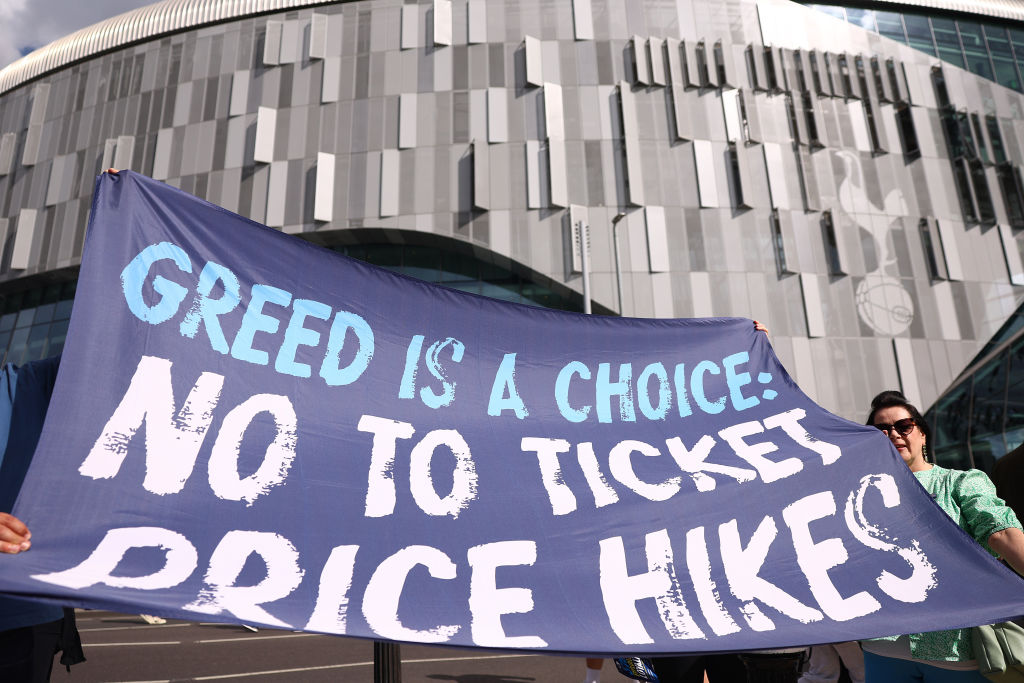It takes quite a lot to unite the fans of Manchester United and Liverpool, but it will happen today at Anfield. Some of the most committed supporters will make a joint protest along with the Football Supporters’ Association at what they see as the exploitative ticket price policies of their respective clubs. There will be demonstrations outside the stadium and a banners bearing the message ‘Stop Exploiting Loyalty’ will be unfurled inside the ground.
The specific target is the trend in rising prices and the gradual disappearance of concessions, which is making regular attendance for generational fans increasingly unaffordable. Manchester United announced a £66 flat rate tariff for members this year while Liverpool raised their prices by 2 per cent for the second year running (after an 8-year freeze), with more expected at the start of the season. The direction of travelis clear, say the protesters: a targeting of occasional fans (tourists basically) and a wealthy elite, at the expense of the faithful.
There are solid business reasons for this strategy. Occasional fans, of whom there is no shortage, will pay almost anything for a one-off visit to the hallowed ground and they spend far more in the souvenir shop when they get there. More than that they then provide free advertising for the clubs through selfies on social media. When they return to their home countries they play an enthusiastic role in the local supporters clubs. They are essentially first class brand ambassadors, except that they pay, rather than get paid, for the privilege.
For those wanting to attend regularly prices are already steep and getting steeper. The ten most expensive season tickets in the world are all Premier League clubs (Arsenal is first at a mind boggling £1,073, a 10 per cent increase on last year). If you don’t fancy that you can become a member, which gives you priority access to ticket releases for individual fixtures, and with persistence might get a few a year, though you probably won’t get to sit where you want, or perhaps even with your friends or family. Failing all that, there’s the secondary market and huge mark ups – the best price currently for tonight’s game is £319.
If that all sounds more trouble than it’s worth, then perhaps that’s the point. For many of the super clubs in England it looks increasingly as if ‘ordinary’ football fans, are the least welcome patrons. With a cost of living crisis, £1,000 a year may soon be justifiable only by the wealthy, corporate elite, with packages for tourists filling up much of the rest of the ground,
However, it is worth considering what it is that is driving this extraordinary level of demand. The Premier League is without doubt the world’s strongest and probably, most intensely competitive elite football competition. It has a fair proportion of the world’s best players and more potential winners (realistically five or six) than its continental rivals. It has the longest history, the most intense rivalries, and more of them, and the most layered and quirkiest fan culture.
As Nick Hornby observed in Fever Pitch, when you attend a top flight game in England you are paying not just for the sporting spectacle, but for the experience of being part of a mass of like-minded passionate knowledgable people who are maintaining and adding to a folkloric culture unavailable anywhere else. This fevered atmosphere is not to everyone’s taste, and it can have an ugly side, but it is rich and raw and visceral, and once gone can never be recaptured.
Ironically, it is that very USP that the slick marketing men at the top clubs risk losing if they alienate the generational fans. The South Koreans who flock to the Tottenham Hotspur stadia to see Son Heung-min aren’t likely to lead a chorus of ‘Oh when The Spurs’, nor are the prawn sandwich munchers at Old Trafford likely to rise to the challenge of Hello, hello, we are the Busby boys’.
It’s a hoary old cliche but fans do make the football experience. Without them, then what? I got a glimpse when I was lucky enough to attend the 2002 World Cup final in Tokyo. All I really remember of the fans was standing in a huge group of Japanese behind the goal who spent the entire game holding up video cameras to capture the experience and hardly made a sound for the entire game. I’m glad I went, but for atmosphere I’d ranked it well below my local derby (Morton vs St..Mirren).
The fans are right to protest, and if they are ignored, may want to consider withdrawing their custom, which includes their labour. For if the clubs do price out their core support they will hollow out their clubs entirely. Eventually, even those starry eyed occasional fans might wonder if it is worth the expense to sit on a plastic seat in a rainy shed when they might as well have stayed at home and watched on TV.








Comments